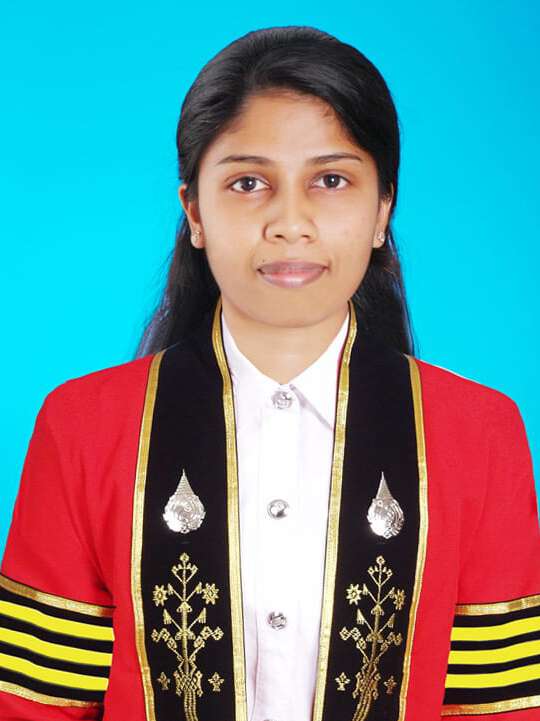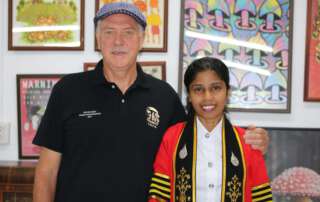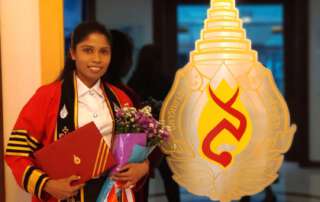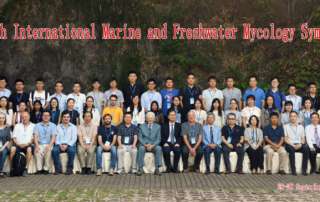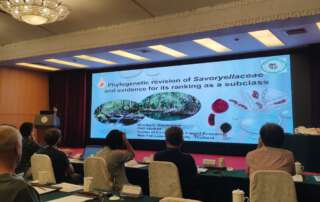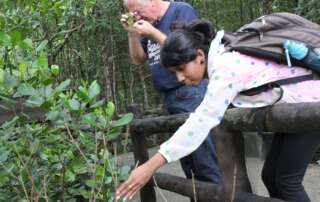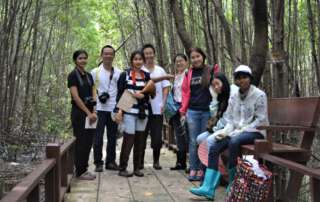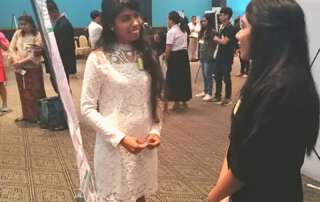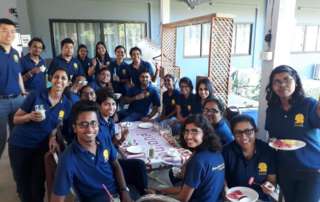University: Mae Fah Luang
Type: PhD student Postgraduate
Course: Ph.D. in Bio-Sciences
Year of graduation or arriving at the University: 2019
Dissertation title: Taxonomy, Phylogeny and Evolution of Selected Ascomycetes, with Particular Emphasis on Saprobic Fungi from Marine Habitats
Advisers and supervisors: Prof. Kevin D. Hyde Prof. Gareth Jones Dr. Kitiphong Khongphinitbunjong
Publications:
- Dayarathne et al. 2015. Phylogenetic and morphological appraisal of Leptosphaeria italica sp. nov. (Leptosphaeriaceae, Pleosporales) from Italy. Mycosphere.
- Dayarathne et al. 2016. Morpho-molecular characterization and epitypification of Annulatascus velatisporus. Mycosphere.
- Dayarathne et al. 2016. Taxonomic utility of old names in current fungal classification and nomenclature: Conflicts, confusion & clarifications. Mycosphere.
- Dayarathne et al. 2016. Halodiatrype, a novel diatrypaceous genus from mangroves with H. salinicola and H. avicenniae spp. nov. Mycosphere.
- Dayarathne et al. 2016. Neophyllachora gen nov. (Phyllachorales), three new species of Phyllachora from Poaceae and resurrection of Polystigmataceae (Xylariales). Mycosphere.
Dayarathne et al. 2017. Multigene phylogeny of Jattaea bruguierae, a novel asexual morph from Bruguiera cylindrica. Studies in Fungi.
Dayarathne et al. 2018. A novel marine genus, Halobyssothecium (Lentitheciaceae) and epitypification of Halobyssothecium obiones comb. nov. Mycological Progress.
Dayarathne et al. 2018. Sexual morph of Phaeoacremonium aureum from Rhizophora mucronata collected in Southern Thailand. Phytotaxa.
Dayarathne et al. 2019. The evolution of Savoryellaceae and evidence for its ranking as a subclass. Frontiers in Microbiology.
Dayarathne et al. 2020. Morpho-molecular characterization of micro fungi associated with marine based habitats. Mycosphere.
Dayarathne et al. 2020. Modern taxonomic approaches to identifying diatrypaceous fungi from marine habitats, with a novel genus Halocryptovalsa Dayarathne & K. D. Hyde, gen. nov. Cryptogamie Mycologie.
Experiences at the University
The Center of Excellence in Fungal Research (CEFR) has provided me with a brilliant opportunity to interact with enthusiastic, adaptive and fast learning budding mycologists as well as experts whose broad and acute interest in mycology is unchallenging. It has been particularly enriching to collaborate with scientists from different disciplines. CEFR has an outstanding way of training students to be excellent mycologists. CEFR will never become obsolete as it drives researchers to explore all the emerging aspects of mycology. I can, today, effectively communicate and collaborate with mycologists at all professional levels, including researchers and students from multiple origins and cultures i.e. China, India, Mauritius, Philippines, Russia, Thailand, and the UK. I have been provided with fantastic opportunities to work both independently and as a team leader or member. This has subsequently helped me accomplish 11 SCI papers as first author and 35 SCI papers as co-author; my publications are mainly related to fungal taxonomy along with advanced molecular genetics and evolutionary studies vis-à-vis mycology emphasizing fungi from marine habitats. All of this has culminated in my achieving an excellent Ph.D. I am very proud to have obtained my Ph.D. from CEFR.
Work experience and present expertise since leaving the University
I successfully secured a postdoctoral position at the Department of Plant Pathology, Guizhou University, China soon after completing my Ph.D. at CEFR. My research is based on DNA Barcoding for Diagnosis of Fungal Plant Pathogens of selected crop diseases in southwestern China and Sri-Lanka.
Alumni wisdom
I would strongly recommend that when you start your Ph.D., read and think widely and exhaustively. Keep your advisors aware of what you are doing but do not bother them. Make your presence interesting and not annoying. Furthermore, do not expect your first paper to be groundbreaking; a lot of eminent people first began with a minor piece of work. Finally, always remember that the only way to be truly satisfied is to do what you believe is great work and the only way to do that is, love what you do
Personal details
Postdoctoral researcher at the Department of Plant Pathology, Guizhou University, China

